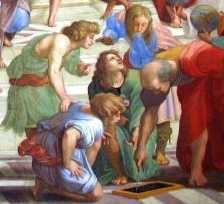Today's mp3 has the kind of imperfection that shows I'm human. I messed up a syllable on the second to last verse, so I recorded it over--slightly flat. If I hadn't said anything, non-musicians probably wouldn't have noticed.
I encourage you to learn the tune and sing along with me. Canamus in the title of this blog is 3rd person plural subjunctive, and means "let us sing."
Mediæ noctis tempus est;
It is the middle of the night;
prophética vox ádmonet
the prophetic voice admonishes
dicámus laudes ut Deo
that we should utter praises to God
Patri semper ac Fílio,
the Father and always to the Son
Sancto quoque Spirítui:
and also to the Holy Spirit:
perfécta enim Trínitas
for the complete Trinity
uniúsque substántiæ
and of one substance
laudánda nobis semper est.
we must always praise.
Terrórem tempus hoc habet,
This time holds terror,
quo, cum vastátor ángelus
for it is the hour when the destroyer angel
Ægýpto mortem íntulit,
brought death in Egypt,
delévit promogénita.
wiped out the first-borns.
Hæc iustis hora salus est,
This hour is salvation to the just,
quos tunc ibidem ángelus
to those at that time the angel
ausus puníre non erat,
did not dare to punish
signum formidans sánguinis.
dreading the sign of the blood.
Ægýptus flebat fórtiter
Egypt was weeping profusely
tantórum diro fúnere;
at so horrible a calamity of death;
solus gaudébat Israel
Israel alone was rejoicing
agni protéctus sánguine.
protected by the blood of the lamb.
Nos verus Israel sumus:
We are the true Israel:
lætámur in te, Dómine,
Let us rejoice in Thee, O Lord,
hostem spernéntes et malum,
and spurning the wicked enemy,
Christi defénsi sánguine.
defended by the blood of Christ.
Dignos nos fac, rex óptime,
Make us worthy, King Most High,
futúri regni glória,
of Thy future reign in glory,
ut mereámur láudibus
that we may deserve to sing together
æternis te concínere. Amen.
praises to Thee eternally.
This author of this 5th century hymn is unknown.
Lentini's "title" is Joy for us, saved by the blood of Christ
Lentini also says "This hymn is mentioned by S. Cesario [whoever that is]. According to the ancient tradition, for its Paschal flavor, it is appropriate for Sunday. Here, for brevity, are only the first 6 verses, and the 13th that can be considered a doxology." It turns out that we get verses 7-10 as part of tomorrow's hymn. Thus we sing it to the same tune.
Tune in tomorrow and canamus.
PODCAzT 187 – Voices of the Fathers 02 – The Martyrdom of St. Cyprian
-
I was recently going through some old books and found a slim volume
entitled The Osterley Selection from the Latin Fathers, edited by Joseph
Crehan of Heyt...
13 hours ago

No comments:
Post a Comment